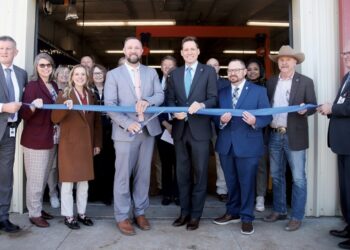By Kevin Gross, CEO Hillcrest HealthCare System
A state cannot succeed to its fullest potential without a thriving workforce, and for the workforce to thrive, the system set up to develop and propel individuals into rewarding careers must fire on all cylinders. As a business leader involved in one of the state’s most important — and short-staffed — industries, I regrettably must report that Oklahoma’s workforce development engine is in need of serious repair.
Fortunately, help is on the way in the form of a bill soon to be considered by the Oklahoma House of Representatives, the Oklahoma Workforce Transformation Act (SB 621).
Oklahoma has all the elements needed to boom. Oklahoma companies are leaders in a number of bedrock industries the rest of the country relies on, from energy and aerospace to health care, telecommunications, and agriculture. We have hardworking, talented men and women who go to work every day carrying within them a hope that their efforts will pave a path to prosperity for them and their family. We have elected state and local leaders who are committed to growing our state’s prosperity by giving aspiring entrepreneurs opportunities to start their success stories, and by welcoming proven companies to expand into the state. Make no mistake about it, Oklahoma is open for business.
But the vast promise and potential of Oklahoma’s future is held back by a lack of coordination, strategy and accountability in our state’s workforce development system. Oklahoma business leaders consistently rate workforce challenges as the most pressing obstacle they face, yet nothing has been done.
Although Oklahoma’s unemployment rate is low, there are thousands of open jobs each month without people with the requisite skills to fill them. Oklahoma ranks 50th out of 50 states in the share of its working-age population holding a STEM or STEM-related degree or credential, 45th in bachelor’s degree attainment, 34th in high school diploma or equivalent attainment, and in the bottom 10 in the nation in virtually all measurements of K-12 education outcomes. The problem is not just in the education system: Oklahoma’s labor participation rate — the percentage of working-age Oklahomans actively participating in the workforce — is staggeringly low at 60.5 percent in December 2022, ranking us 35th in the nation. A full 5.5 percent of Oklahoma’s working-age adults are on Social Security Disability, comprising a larger share of our labor force than 35 of the 50 states.
Many factors contribute to these troubling outcomes, but at the heart of the problem is the disjointed nature of the state programs and entities we task with filling our talent pipeline. Put simply, just about every aspect of state government has a hand in workforce development, but no one is captaining the ship. Oklahoma’s workforce development programs and providers are severely siloed, and there is not one person or entity tasked with coordinating them. What is desperately needed is someone at the helm that wakes up every day and goes to work thinking solely about how to deliver the talent pipeline Oklahoma needs to grow and individuals need to climb the ladder of success.
Senate Bill 621 brings order to our uncoordinated workforce development efforts by creating an accountable owner of the problem, the Oklahoma Workforce Commission. Importantly, the commission will not be a new government agency, but will be made up of business leaders from the private sector who will be tasked with identifying our most critical workforce priorities, developing a strategy to meet those needs and aligning the disparate parts of the workforce development system to the strategic plan.
By designating an accountable owner of our workforce challenge, Oklahoma will be able to clearly establish strategic workforce development goals, reduce administrative costs, eliminate wasteful duplication, align funding with priorities, and hold state entities accountable for results. The bill presents a plan that will establish leadership and bring the state’s workforce into alignment.
Oklahoma has the ingredients necessary for the type of sustained economic growth that lifts all Oklahomans. The time is now to refocus Oklahoma’s goals across our workforce development system. Doing so will help revitalize our economy and create a promise of prosperity that will grow this state into the future. Passing SB 621 is essential for Oklahoma to succeed.

















